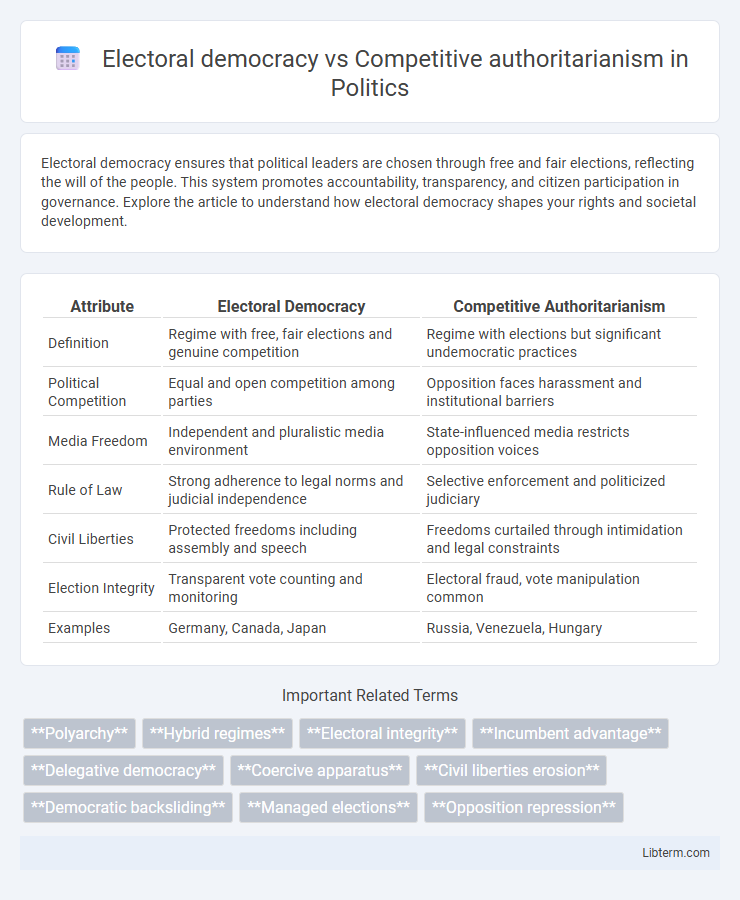Electoral democracy ensures that political leaders are chosen through free and fair elections, reflecting the will of the people. This system promotes accountability, transparency, and citizen participation in governance. Explore the article to understand how electoral democracy shapes your rights and societal development.
Table of Comparison
| Attribute | Electoral Democracy | Competitive Authoritarianism |
|---|---|---|
| Definition | Regime with free, fair elections and genuine competition | Regime with elections but significant undemocratic practices |
| Political Competition | Equal and open competition among parties | Opposition faces harassment and institutional barriers |
| Media Freedom | Independent and pluralistic media environment | State-influenced media restricts opposition voices |
| Rule of Law | Strong adherence to legal norms and judicial independence | Selective enforcement and politicized judiciary |
| Civil Liberties | Protected freedoms including assembly and speech | Freedoms curtailed through intimidation and legal constraints |
| Election Integrity | Transparent vote counting and monitoring | Electoral fraud, vote manipulation common |
| Examples | Germany, Canada, Japan | Russia, Venezuela, Hungary |
Understanding Electoral Democracy
Electoral democracy is characterized by free, fair, and competitive elections where multiple political parties participate and citizens have the genuine right to choose their leaders. It ensures the rule of law, protection of civil liberties, and independent institutions that prevent government abuse of power. Key indicators of electoral democracy include transparency in electoral processes, equal access to media, and mechanisms for accountability and citizen participation.
Defining Competitive Authoritarianism
Competitive authoritarianism is a hybrid regime where formal democratic institutions exist but are heavily skewed in favor of the incumbent, undermining genuine political competition. Unlike full electoral democracies, these regimes allow opposition parties and elections but manipulate media, judiciary, and electoral rules to limit opposition success. This system blurs the line between authoritarianism and democracy by maintaining a facade of democracy while restricting meaningful opposition challenge.
Key Features of Electoral Democracies
Electoral democracies are characterized by free, fair, and competitive elections where multiple political parties have the genuine opportunity to gain power through the ballot. A robust rule of law ensures civil liberties such as freedom of speech, assembly, and press, allowing citizens to participate actively and hold leaders accountable. Independent electoral bodies and transparent electoral processes further reinforce legitimacy and political pluralism in these systems.
Characteristics of Competitive Authoritarian Regimes
Competitive authoritarian regimes maintain the formal institutions of democracy, such as elections and opposition parties, but these are systematically undermined by incumbents through manipulation, media control, and legal harassment. Leaders employ state resources and electoral fraud to skew competition while allowing limited pluralism to create a facade of legitimacy. Unlike full authoritarian regimes, competitive authoritarianism permits some political contestation but lacks genuine democratic accountability and fair electoral competition.
Historical Evolution of Both Systems
Electoral democracy has its roots in Enlightenment ideals, evolving through centuries as expanded suffrage, rule of law, and institutional checks and balances became standard features in Western political systems by the 19th and 20th centuries. Competitive authoritarianism emerged in the late 20th century as hybrid regimes that combine formal democratic institutions with autocratic practices, particularly in post-Soviet and developing states where elections occur but incumbents manipulate media, electoral bodies, and legal frameworks to maintain power. The historical shift reflects a global pattern where established democracies increasingly contrast with regimes that maintain a facade of electoral legitimacy while undermining genuine political competition.
Case Studies: Examples Around the World
Electoral democracy features competitive elections and robust civil liberties as seen in countries like Germany and Canada, where political institutions ensure transparency and voter participation. Competitive authoritarian regimes, such as Russia and Venezuela, maintain the facade of multiparty elections while suppressing opposition and controlling media, undermining genuine democratic processes. Case studies reveal how institutional strength and civil society resilience influence the trajectory toward either democratic consolidation or authoritarian backsliding globally.
The Role of Elections in Each System
In electoral democracy, elections function as free, fair, and periodic mechanisms that ensure genuine political competition and reflect the will of the populace, sustaining accountability and legitimacy. Competitive authoritarianism features elections that are regularly held but systematically manipulated by incumbents through media control, legal harassment, and electoral fraud, undermining true political competition. While electoral democracy empowers voters to choose leaders and influence policy, competitive authoritarian regimes use elections primarily to maintain a facade of legitimacy without ceding real power.
Political Institutions and Power Distribution
Electoral democracy features robust political institutions with clear separation of powers, ensuring free and fair elections, independent judiciary, and accountable governance. Competitive authoritarianism maintains superficial democratic institutions but power is concentrated in the hands of incumbents who manipulate electoral processes, weaken judicial independence, and limit opposition activities. Political power distribution in electoral democracies favors pluralism and institutional checks, whereas competitive authoritarian regimes centralize power and undermine democratic norms to maintain control.
Impacts on Civil Liberties and Media Freedom
Electoral democracy ensures robust protection of civil liberties, including freedom of speech, assembly, and press, allowing independent media to operate without state interference. In contrast, competitive authoritarian regimes maintain formal electoral processes but systematically restrict civil liberties by controlling media narratives, censoring dissent, and limiting opposition voices. This suppression undermines public access to unbiased information and weakens democratic accountability.
Challenges and Prospects for Democratization
Electoral democracy faces challenges such as voter suppression, weak rule of law, and limited political pluralism that hinder genuine representation and political accountability. Competitive authoritarianism blends democratic institutions with authoritarian practices, often undermining free elections and civil liberties, which complicates prospects for full democratization. The path to democratization requires strengthening institutional checks, ensuring electoral transparency, and promoting inclusive political participation to transition from hybrid regimes to stable democratic governance.
Electoral democracy Infographic

 libterm.com
libterm.com